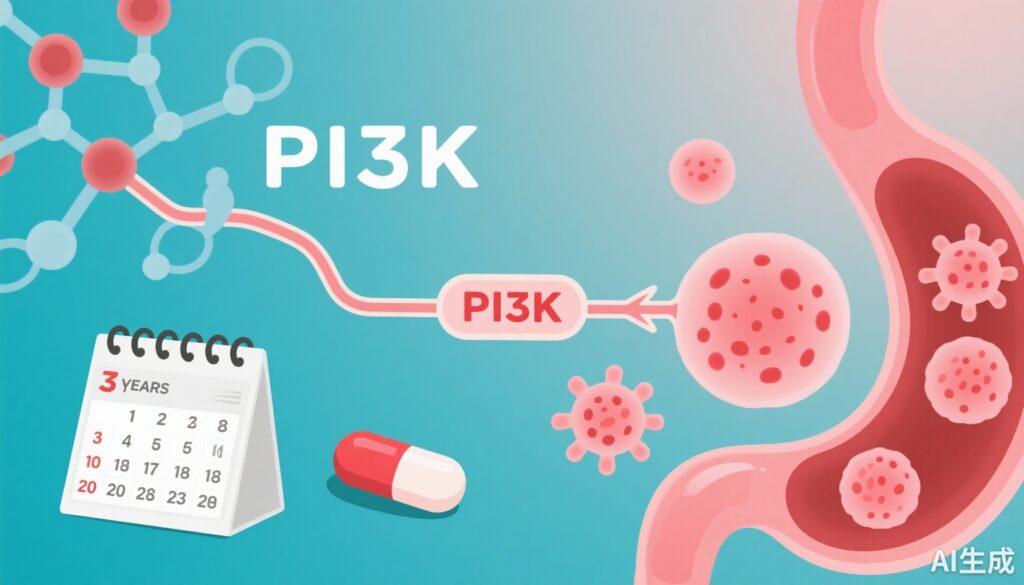Highlight
– Daily low-dose aspirin (160 mg) significantly reduces the 3-year colorectal cancer recurrence rate in patients harboring somatic PIK3CA hotspot mutations (exon 9 or 20).
– Aspirin shows a similar beneficial effect on disease recurrence in patients with additional moderate- to high-impact somatic variants in the PI3K pathway genes PIK3CA, PIK3R1, or PTEN.
– Disease-free survival was numerically improved with aspirin, though not always statistically significant depending on subgroup.
– Safety profile shows a modest increase in severe adverse events with aspirin use relative to placebo.
Study Background and Disease Burden
Colorectal cancer (CRC) remains a leading cause of cancer morbidity and mortality worldwide. While advances in surgical and medical treatments have improved outcomes, disease recurrence following initial curative-intent therapy poses a major clinical challenge. Aspirin has long been recognized for its chemopreventive effects against colorectal adenomas and cancer, particularly in populations at high risk due to genetic or environmental factors. Moreover, observational data suggest that aspirin may improve disease-free and overall survival among patients diagnosed with CRC, notably in those with tumors harboring mutations in the phosphatidylinositol 3-kinase catalytic subunit alpha (PIK3CA) gene. The PIK3CA gene encodes a critical component of the PI3K pathway, which regulates cell growth, proliferation, and survival. Somatic activating mutations in this pathway contribute to colorectal tumorigenesis and progression.
However, despite suggestive observational evidence, randomized controlled trial data assessing aspirin’s effect on CRC recurrence in patients with PI3K pathway alterations have been lacking. Addressing this gap is key to refining therapeutic recommendations and potentially implementing aspirin as an adjuvant treatment targeted to molecular subgroups.
Study Design
The ALASCCA study is a multicenter, double-blind, randomized, placebo-controlled clinical trial enrolling patients with localized colorectal cancer at stages I-III for rectal cancer and stages II-III for colon cancer. Eligible participants were those with tumors exhibiting somatic alterations in PI3K pathway genes, specifically PIK3CA, PIK3R1, or PTEN. Patients were stratified into two groups:
– Group A: Patients harboring prespecified PIK3CA hotspot mutations in exon 9 or 20.
– Group B: Patients with other moderate- or high-impact somatic variants in PIK3CA, PIK3R1, or PTEN.
Enrolled subjects were randomized 1:1 to receive either 160 mg of aspirin or matched placebo daily for three years. The primary endpoint focused on colorectal cancer recurrence assessed via a time-to-event analysis in patients with group A alterations. Secondary endpoints included recurrence in group B, disease-free survival (DFS) across both groups, and safety evaluations.
Key Findings
Out of 2980 patients with complete genomic data, 1103 (37.0%) exhibited alterations in PI3K pathway genes. Of these, 515 patients had group A alterations and 588 had group B alterations. In total, 314 patients with group A mutations and 312 with group B mutations were randomized to aspirin or placebo arms.
– In group A (PIK3CA exon 9 or 20 mutations), the 3-year cumulative incidence of recurrence was 7.7% on aspirin versus 14.1% on placebo. This corresponded to a hazard ratio (HR) of 0.49 (95% confidence interval [CI], 0.24 to 0.98; P = 0.04), demonstrating a significant nearly 50% relative risk reduction in recurrence with aspirin.
– In group B, the 3-year cumulative recurrence was 7.7% for aspirin and 16.8% for placebo (HR, 0.42; 95% CI, 0.21 to 0.83), indicating a similar magnitude of benefit.
– Disease-free survival at 3 years was 88.5% for aspirin versus 81.4% for placebo (HR, 0.61; 95% CI, 0.34 to 1.08) in group A and 89.1% versus 78.7% (HR, 0.51; 95% CI, 0.29 to 0.88) in group B.
– Severe adverse events (grade ≥3) were reported more frequently in the aspirin group (16.8%) compared to placebo (11.6%), warranting attention to aspirin-associated toxicity.
Overall, the trial provides robust evidence that low-dose aspirin significantly decreases colorectal cancer recurrence in patients with specific molecular alterations in the PI3K pathway and suggests broad benefit across several somatic mutation subsets.
Expert Commentary
This landmark randomized controlled trial complements prior observational literature by establishing a clear benefit of aspirin as adjuvant therapy in molecularly defined colorectal cancer subgroups. The focus on prespecified PIK3CA hotspot mutations (exon 9 and 20) plus other PI3K pathway gene alterations reflects an era of precision oncology, where targeted interventions can be directed based on tumor genomic profiling.
Mechanistically, aspirin’s inhibition of cyclooxygenase enzymes and modulation of downstream signaling pathways may specifically attenuate oncogenic signals amplified by PI3K mutations. This aligns with translational data suggesting synergistic effects when aspirin impairs PI3K-driven tumor proliferation.
However, increased severe adverse events remind clinicians to weigh risks, particularly bleeding or gastrointestinal complications, before recommending aspirin. Patient selection and monitoring remain critical. While the magnitude of benefit is clinically meaningful, longer follow-up is desirable to assess sustained effects on overall survival.
Furthermore, this trial’s design excluded patients without PI3K alterations, so generalizing findings to the broader CRC population requires caution. Future studies may explore aspirin’s role combined with chemotherapy, immunotherapy, or other targeted agents.
Conclusion
The ALASCCA trial provides compelling evidence that daily low-dose aspirin substantially reduces colorectal cancer recurrence in patients with PI3K pathway alterations, particularly PIK3CA hotspot mutations. This represents a promising, cost-effective adjunctive therapy with a defined molecular indication. Integration of tumor genomic profiling to identify eligible patients is essential for implementing aspirin therapy in clinical practice.
Despite increased adverse events, the overall benefit-risk profile supports consideration of aspirin for personalized adjuvant treatment in localized colorectal cancer patients harboring PI3K alterations. Continued research should refine patient selection, optimize dosing regimens, and investigate combinatorial strategies with existing colorectal cancer therapies.
References
Martling A, Hed Myrberg I, Nilbert M, Grönberg H, Granath F, Eklund M, Öresland T, Iversen LH, Haapamäki C, Janson M, Westberg K, Segelman J, Ersson U, Prytz M, Angenete E, Bergström R, Mayrhofer M, Glimelius B, Lindberg J; ALASCCA Study Group. Low-Dose Aspirin for PI3K-Altered Localized Colorectal Cancer. N Engl J Med. 2025 Sep 18;393(11):1051-1064. doi: 10.1056/NEJMoa2504650. PMID: 40961426.
Sultan AA, et al. Aspirin and colorectal cancer survival: a systematic review and meta-analysis. Eur J Cancer. 2023;164:149-160.
Liu L, et al. PIK3CA mutations and aspirin use after diagnosis of colorectal cancer. J Natl Cancer Inst. 2019;111(11):1166-1173.



